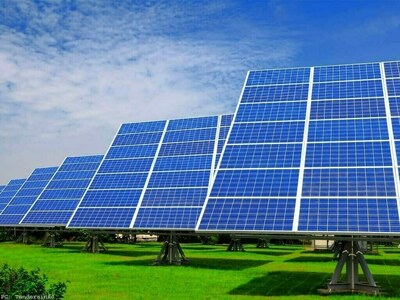Parliamentary Committee Rejects Sales Tax on Solar Panels
The National Assembly Standing Committees on Finance and Revenue have unanimously dismissed the proposal to impose an 18 percent sales tax on the import of solar panels. Citing rising energy costs and public concerns, the committees deemed the tax unacceptable and potentially counterproductive.
During a session chaired by Syed Naveed Qamar, the parliamentary panel approved the Digital Presence Proceeds Tax Act, 2025. This act introduces a new five percent tax on proceeds from digitally ordered goods, aiming to protect taxing rights in the digital marketplace.
The Federal Board of Revenue (FBR) acknowledged that eliminating tax rates below 18 percent on motor vehicles would lead to increased prices.
The FBR chairman suggested that additional measures might be necessary if the GST on solar panels is withdrawn. This is to compensate for the estimated revenue loss of Rs40 billion, comprising Rs20 billion in revenue and Rs20 billion in subsidy.
The FBR chairman stated to the committee that both importing and supplying photovoltaic cells, whether assembled in modules or panels, are exempt from sales tax. This exemption primarily benefits commercial importers, while the local industry faces competitiveness challenges due to the absorption of input tax costs on purchases.
The committee members collectively voiced their opposition to the FBR’s proposition to levy a sales tax on solar panels, pointing out that solar panel prices in the country have already surged since the budget proposal.
The committee chairman emphasized that all political parties in Parliament opposed taxing solar energy products, which are increasingly utilized by households and businesses as an alternative to expensive electricity.
Federal Finance Minister Muhammad Aurangzeb responded to the concerns by indicating that some of the committee’s recommendations had been taken into consideration for review.
Qamar affirmed the committee’s unanimous rejection of the FBR’s proposal to impose an 18 percent sales tax on solar panels, labeling it as counterproductive. Mirza Ikhtiar stated, “Tax should not be imposed on solar panels if we are promoting renewable energy.” He added that imported solar panels are cheaper than locally manufactured ones, which are also of substandard quality.
Shahram Khan Taraki described the government policy as confusing and suggested transferring technology along with solar panel imports.
The FBR chairman revealed the establishment of over invoicing amounting to Rs65 billion in solar panel imports, which constitutes money laundering and results in dollars leaving the country.
Under the Digital Presence Proceeds Tax Act, foreign vendors providing e-commerce goods will be taxed at five percent. This proposed Act mandates payment intermediaries, including banks and financial institutions, to collect tax on digital payments made to foreign vendors supplying goods into Pakistan. Services are excluded from this act.
Digital advertising by offering vendors, such as Temu, in the Pakistani market via platforms like Google will also be taxed, aligning with Pakistan’s taxing rights. The committee learned that Temu generated Rs4 billion from the Pakistani market but paid no income tax.
During the briefing on removing tax rates below 18 percent on motor vehicles, the FBR clarified that this does not apply to electric vehicles.
The FBR informed the committee that under the International Monetary Fund (IMF)’s arrangement, they are required to increase the reduced rates in sales tax. The current rate above five percent would increase to 10 percent, while the rate above 10 percent would be increased to 18 percent, leading to an increase in motor vehicle prices.
The committee also rejected the FBR’s proposal to establish a separate Customs Command Fund (CCF) for customs officials.



Comments (0)
No comments yet. Be the first to comment!
Leave a Comment